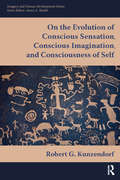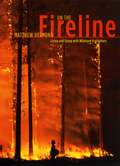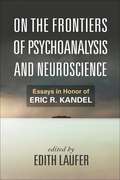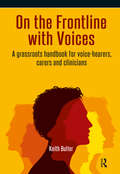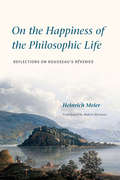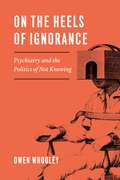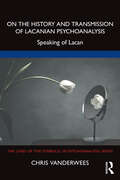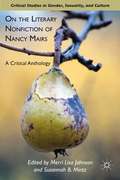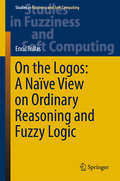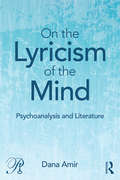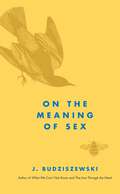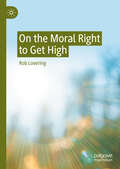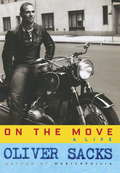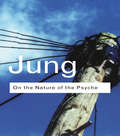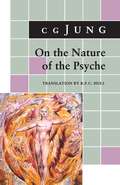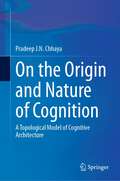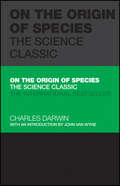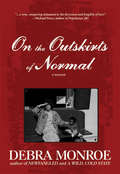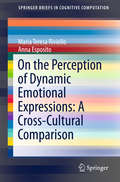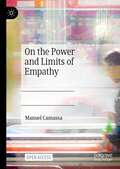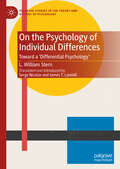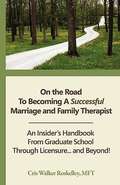- Table View
- List View
On the Evolution of Conscious Sensation, Conscious Imagination, and Consciousness of Self (Imagery and Human Development Series)
by Robert G KunzendorfPhilosophical 'thought experiments' invoking inverted spectra, zombies, et cetera suggest that conscious sensations have no function, and psychological studies finding no correlation between vivid visual imaging and visual problem solving suggest that conscious images have no function. Furthermore, both philosophical and psychological theories suggest that self-consciousness has no function. Countering such suggestions, the post-Darwinian double-aspect theory which Professor Robert Kunzendorf's introduces in the first chapter of his monograph On the Evolution of Conscious Sensation, Conscious Imagination, and Consciousness of Self points to evolutionary functions of certain sensations, youngling vivid images, and self-consciousness. Kunzendorf's second chapter presents evidence that the most primitive sensation-pain, the subjective aspect of free nerve endings or nociceptors-has a survival-promoting function. But as the pressure nociceptor mutates into a touch receptor, the heat nociceptor into temperature receptor, and the chemical nociceptor into a taste receptor, the painful qualia of these nociceptors evolve respectively into touch sensation, temperature sensation, or taste sensation-painless sensations that add no survival benefit to their receptor's physical aspect. Building on evidence that retinal receptors embodying visual qualia evolved from primitive eyespots responsive to injurious 'heat at a distance' or painful light, the third chapter presents evidence that visually imagined sensations are the subjective qualities of retinal receptors that are corticofugally innervated in warm-blooded animals-for the developmental purpose of testing cortically hypothesized sensory-motor rules that have greater survival value than cold-blooded stimulus-response associations. The fourth and final chapter focuses on self-conscious reality-testing and on visuo-spatial self-conceptualization, and presents evidence that such manifestations of self-awareness evolve only in those warm-blooded animals whose rule-developing youth lasts two years or longer-that is, those mammals and birds whose survival during the imaginal testing of rules is subjected to prolonged risk if self-consciousness that one is imaging sensations (rather than perceiving sensations) is absent.
On the Fireline: Living and Dying with Wildland Firefighters
by Matthew DesmondIn this rugged account of a rugged profession, Matthew Desmond explores the heart and soul of the wildland firefighter. Having joined a firecrew in Northern Arizona as a young man, Desmond relates his experiences with intimate knowledge and native ease, adroitly balancing emotion with analysis and action with insight. On the Fireline shows that these firefighters aren’t the adrenaline junkies or romantic heroes as they’re so often portrayed.
On the Frontiers of Psychoanalysis and Neuroscience: Essays in Honor of Eric R. Kandel
by Joseph Ledoux Mark Solms Edith LauferBuilding crucial bridges between psychoanalysis and the neurosciences, this compelling volume brings together prominent authorities from multiple disciplines. The volume highlights the contributions of Eric R. Kandel, whose seminal articles helped launch the fledgling field of neuropsychoanalysis. Contributors address what contemporary neuroscientific research reveals about how psychoanalytic techniques work and why they are effective. Also examined are ways in which psychoanalysis can contribute to scientific explorations of the mind. Each chapter is followed by a thoughtful response. This material was originally published as a special issue of The Psychoanalytic Review (Vol. 99, No. 4, 2012), editor, Alan J. Barnett, PhD.
On the Frontline with Voices: A Grassroots Handbook for Voice-Hearers, Carers and Clinicians
by Keith ButlerThis is a jargon-free, user-friendly resource for voice-hearers and their carers, as well as the clinicians and groups who support them both. It offers a new and practical way of looking at voice-hearing as well as a host of practical strategies to assist in recovery. The resource is built around three core sections. Each of the sections speaks directly to voice-hearers, clinicians and carers, in turn. The style and content addresses each group's individual needs in terms appropriate to them and schools them in how to deal with voices from their particular perspective. The core aim is to provide these three groups with practical techniques they can use on a daily basis. The resource offers a proactive, practical and client-centred framework that is designed to reduce anxiety and increase the likelihood of learning new ways to deal with voices. Keith Butler is a consultant clinical psychologist and an associate fellow of the BPS (British Psychological Society). He was a key player in the development of the Buckinghamshire Early Intervention Service (BEIS) and occupied the position of clinical lead in the BEIS for its first 6 years up to his retirement at the end of 2010.
On the Ground After September 11: Mental Health Responses and Practical Knowledge Gained
by Yael Danieli Robert L DingmanA heartfelt collection of extraordinary first-person accounts that delve into every level of the experience of 9/11Out of the infamy of 9/11 and its aftermath people rose up with courage and determination to meet formidable challenges. On the Ground After September 11: Mental Health Responses and Practical Lessons Gained is a stirring compilation of over a hundred personal and professional first-hand accounts of the entire experience, from the moment the first plane slammed into the North Tower of the World Trade Center, to the months mental health professionals worked to ease the pain and trauma of others even while they themselves were traumatized. This remarkable chronicle reveals the breadth and depth of human need and courage along with the practical organizational considerations encountered in the responses to terrorist attacks. The goal of any terrorist act is to instill psychosocial damage to a society to effect change. On the Ground After September 11 provides deep insight into the damage the attack had on our own society, the failures and victories within our response systems, and the path of healing that mental health workers need to travel to be of service to their clients. Personal accounts written by the professionals and public figures involved reveal the broad range of responses to this traumatic event and illuminate how mental health services can most effectively be delivered. Through the benefit of hindsight, recommendations are described for ways to better finance assistance, adapt the training of mental health professionals, and modify organizations&’ response to the needs of victims in this type of event. Reading these unique personal accounts of that day and the difficult days that followed provides a thoughtful, moving, rational view of what is truly needed in times of disaster.On the Ground After September 11 includes the first-person experiences and lessons learned from the people of: NYU Downtown Hospital NYC Department of Health and Mental Hygiene NY Metropolitan Transportation Council St. Paul&’s Chapel St. Vincent Hospital - Manhattan Safe Horizon LifeNet WTC Incident Command Center at NYC Medical Examiner&’s office New Jersey&’s Project Phoenix Massachusetts Department of Mental Health the military psychiatric response to the Pentagon attack Connecticut&’s Center for Trauma Response, Recovery, and Preparedness the Staten Island Relief Center Barrier Free Living Inc. for people with disabilities the Federal Emergency Management Agency Alianza Dominicana, Inc. Staten Island Mental Health Society the United Airlines Emergency Response Team for Flight 93 The Center for Trauma Response, Recovery, and Preparedness (CTRP) Disaster Mental Health Services (DMHS) at Dulles International Airport the American Red Cross the Respite Center at the Great White Tent HealthCare Chaplaincy The Salvation Army the Islamic Circle of North America The Coalition of Voluntary Mental Health Agencies, Inc. F*E*G*S the Jewish Board of Family and Children's Services (JBFCS) and many, many moreOn the Ground After September 11: Mental Health Responses and Practical Lessons Gained poignantly illustrates that regardless of profession, culture, religion, or age, every life touched by 9/11 will never be the same. This is essential reading for counselors, psychologists, psychiatrists, social workers, therapists, trauma specialists, educators, and students.
On the Happiness of the Philosophic Life
by Heinrich Meier Robert BermanOn the Happiness of the Philosophic Life presents Heinrich Meier's confrontation with Rousseau's Rêveries, the philosopher's most beautiful and daring work, as well as his last and least understood. Bringing to bear more than thirty years of study of Rousseau, Meier unfolds his stunningly original interpretation in two parts. The first part of On the Happiness of the Philosophic Life approaches the Rêveries not as another autobiographical text in the tradition of the Confessions and the Dialogues, but as a reflection on the philosophic life and the distinctive happiness it provides. The second turns to a detailed analysis of a work referred to in the Rêveries, the "Profession of Faith of the Savoyard Vicar," which triggered Rousseau's political persecution when it was originally published as part of Émile. In his examination of this most controversial of Rousseau's writings, which aims to lay the foundations for a successful nonphilosophic life, Meier brings to light the differences between natural religion as expressed by the Vicar and Rousseau's natural theology. Together, the two reciprocally illuminating parts of this study provide an indispensable guide to Rousseau and to the understanding of the nature of the philosophic life.
On the Heels of Ignorance: Psychiatry and the Politics of Not Knowing
by Owen WhooleyPsychiatry has always aimed to peer deep into the human mind, daring to cast light on its darkest corners and untangle its thorniest knots, often invoking the latest medical science in doing so. But, as Owen Whooley’s sweeping new book tells us, the history of American psychiatry is really a record of ignorance. On the Heels of Ignorance begins with psychiatry’s formal inception in the 1840s and moves through two centuries of constant struggle simply to define and redefine mental illness, to say nothing of the best way to treat it. Whooley’s book is no antipsychiatric screed, however; instead, he reveals a field that has muddled through periodic reinventions and conflicting agendas of curiosity, compassion, and professional striving. On the Heels of Ignorance draws from intellectual history and the sociology of professions to portray an ongoing human effort to make sense of complex mental phenomena using an imperfect set of tools, with sometimes tragic results.
On the History and Transmission of Lacanian Psychoanalysis: Speaking of Lacan
by Chris VanderweesOn the History and Transmission of Lacanian Psychoanalysis addresses key questions about the history and transmission of Jacques Lacan’s work in North America through discussions with experienced psychoanalysts (who are also trained psychiatrists, psychologists, and psychotherapists). Chris Vanderwees presents conversations with clinicians about their psychoanalytic formation and about the development of Lacanian psychoanalysis in North America over the past several decades. With oral narrative brought out through the technique of free association, then transcribed and annotated, each discussion is a trace of Vanderwees’ encounter with each clinician and the result of collaborative efforts involving speech, writing, translation, and transmission. The conversational tone makes these discussions accessible not only for those already well-versed in Lacan’s thinking, but also for anyone discovering his work for the first time. The range of contributions spans both French and English-speaking Canada, the United States, and Mexico. Complemented by On the Theory and Clinic of Lacanian Psychoanalysis, this book of conversations conveys the diversity of historical and pedagogical perspectives on theory and practice as inspired by Lacan’s system of thought. It will be of great interest to all psychoanalytic practitioners as well as academics and scholars of psychoanalysis.
On the Literary Nonfiction of Nancy Mairs
by Merri Lisa Johnson Susannah B. MintzWhere much of the existing scholarship on Nancy Mairs has approached her essays in the context of disability studies, this book seeks to broaden the conversation through a wider range of critical perspectives and with attention to underrepresented aspects of Mairs's oeuvre. With particular attention to the ways Mairs shapes her essays around a variety of "unspeakables" - such as depression, female sexuality and infidelity, mortality and death, or the struggle for faith in a post-modern world - this collection demonstrates Mairs's provocative combination of bold ethics and subtle aesthetics.
On the Logos: A Naïve View on Ordinary Reasoning and Fuzzy Logic (Studies in Fuzziness and Soft Computing #354)
by Enric TrillasThis book offers an inspiring and naïve view on language and reasoning. It presents a new approach to ordinary reasoning that follows the author’s former work on fuzzy logic. Starting from a pragmatic scientific view on meaning as a quantity, and the common sense reasoning from a primitive notion of inference, which is shared by both laypeople and experts, the book shows how this can evolve, through the addition of more and more suppositions, into various formal and specialized modes of precise, imprecise, and approximate reasoning. The logos are intended here as a synonym for rationality, which is usually shown by the processes of questioning, guessing, telling, and computing. Written in a discursive style and without too many technicalities, the book presents a number of reflections on the study of reasoning, together with a new perspective on fuzzy logic and Zadeh’s “computing with words” grounded in both language and reasoning. It also highlights some mathematical developments supporting this view. Lastly, it addresses a series of questions aimed at fostering new discussions and future research into this topic. All in all, this book represents an inspiring read for professors and researchers in computer science, and fuzzy logic in particular, as well as for psychologists, linguists and philosophers.
On the Lyricism of the Mind: Psychoanalysis and literature (Psychoanalysis in a New Key Book Series)
by Dana AmirOn the Lyricism of the Mind: Psychoanalysis and Literature explores the lyrical dimension (or the lyricism) of the psychic space. It is not presented as an artistic disposition, but rather as a universal psychic quality which enables the recovery and recuperation of the self. The specific nature of human lyricism is defined as the interaction as well as the integration of two psychic modes of experience originally defined by the psychoanalyst Wilfred Bion: The emergent and the continuous principles of the self. Dana Amir elaborates Bion's general notion of an interaction between the emergent and the continuous principles of the self, offering a discussion of the specific function of each principle and of the significance of the various types of interaction between them as the basis for mental health or pathology. The author applies these theoretical notions in her analytic work by means of literary illustrations showing how the lyrical dimension may be used to teach psychoanalytic readings of literature and explore the connection between psychoanalytic and literary languages. On the Lyricism of the Mind presents a new psychoanalytic understanding of the capacity to heal, to grieve, to love and to know, using literary illustrations but also literary language in order to extract a new formulation out of the classic psychoanalytic language of Winnicott and Bion. This book will appear to a wide audience to include psychoanalysts, psychotherapists and art therapists. It is also extremely relevant to literary scholars, including students of literary criticism, philosophers of language and philosophers of mind, novelists, poets, and to the wide educated readership in general.
On the Meaning of Sex
by J. BudziszewskiOur society is obsessed with sex - and yet we don't understand it at all. Acclaimed philosopher J. Budziszewski remedies the problem in this wise, gracefully written book about the nature, meaning, and mysteries of sexuality. On the Meaning of Sex corrects the most prevalent errors about sex - particularly those of the sexual revolution, which by mistaking pleasure for a good in itself has caused untold pain and suffering.
On the Moral Right to Get High
by Rob LoveringIs getting high immoral? In this book, Rob Lovering defends the claim that it is not. More specifically, he argues that recreational drug use (of which getting high is a token) is neither intrinsically, nor generally extrinsically, immoral. In other words, he contends that recreational drug use is neither immoral in and of itself nor generally immoral due to an immoral-making factor with which it may be contingently linked [e.g., harm]. Lovering does so by offering two arguments for recreational drug use&’s ultima facie (all things considered) moral permissibility and critiquing twenty-four arguments for its immorality.Meant to be a companion to Lovering's A Moral Defense of Recreational Drug Use (Palgrave Macmillan, 2015), which was written for a general audience, this book is written for an academic—specifically, philosophical—audience and explores recreational drug use in a deeper, more philosophically and empirically rigorous way.
On the Move
by Oliver SacksAn impassioned, tender, and joyous memoir by the author of Musicophilia and The Man Who Mistook His Wife for a Hat. When Oliver Sacks was twelve years old, a perceptive schoolmaster wrote in his report: "Sacks will go far, if he does not go too far." It is now abundantly clear that Sacks has never stopped going. From its opening pages on his youthful obsession with motorcycles and speed, On the Move is infused with his restless energy. As he recounts his experiences as a young neurologist in the early 1960s, first in California, where he struggled with drug addiction and then in New York, where he discovered a long-forgotten illness in the back wards of a chronic hospital, we see how his engagement with patients comes to define his life. With unbridled honesty and humor, Sacks shows us that the same energy that drives his physical passions--weight lifting and swimming--also drives his cerebral passions. He writes about his love affairs, both romantic and intellectual; his guilt over leaving his family to come to America; his bond with his schizophrenic brother; and the writers and scientists--Thom Gunn, A. R. Luria, W. H. Auden, Gerald M. Edelman, Francis Crick--who influenced him. On the Move is the story of a brilliantly unconventional physician and writer--and of the man who has illuminated the many ways that the brain makes us human.
On the Move: A Life
by Oliver SacksWhen Oliver Sacks was twelve years old, a perceptive schoolmaster wrote in his report: "Sacks will go far, if he does not go too far." It is now abundantly clear that Sacks has never stopped going. From its opening pages on his youthful obsession with motorcycles and speed, On the Move is infused with his restless energy. As he recounts his experiences as a young neurologist in the early 1960s, first in California, where he struggled with drug addiction, and then in New York, where he discovered a long-forgotten illness in the back wards of a chronic hospital, we see how his engagement with patients comes to define his life.With unbridled honesty and humor, Sacks shows us that the same energy that drives his physical passions--weight lifting and swimming--also drives his cerebral passions. He writes about his love affairs, both romantic and intellectual; his guilt over leaving his family to come to America; his bond with his schizophrenic brother; and the writers and scientists--Thom Gunn, A. R. Luria, W. H. Auden, Gerald M. Edelman, Francis Crick--who influenced him. On the Move is the story of a brilliantly unconventional physician and writer--and of the man who has illuminated the many ways that the brain makes us human.From the Hardcover edition.
On the Nature of the Psyche (Routledge Classics)
by C. G. JungJung's discovery of the 'collective unconscious', a psychic inheritance common to all humankind, transformed the understanding of the self and the way we interpret the world. In On the Nature of the Psyche Jung describes this remarkable theory in his own words, and presents a masterly overview of his theories of the unconscious, and its relation to the conscious mind. Also contained in this collection is On Psychic Energy, where Jung defends his interpretation of the libido, a key factor in the breakdown of his relations with Freud. For anyone seeking to understand Jung's insights into the human mind, this volume is essential reading.
On the Nature of the Psyche: (From Collected Works Vol. 8) (Jung Extracts #6)
by C. G. JungExtracted from Volume 8. Includes the title essay and "On Psychic Energy."
On the Origin and Nature of Cognition: A Topological Model of Cognitive Architecture
by Pradeep J.N. ChhayaThis monograph is an extension of the earlier monographs dealing with the application of the new modified involuted manifold model. This monograph has two objectives. Firstly, it seeks to integrate neuronal organization with cognitive functionalities. Secondly, it tries to formalize a structural template of cognitive functionalities. It is based on the postulate that cognitive functionalities are essentially natural phenomena and therefore amenable to formal naturalistic description. Therefore, it employs a topological model of spacetime proposed earlier to define a new framework wherein neuronal networks occupy the four-dimensional configurations of spacetime, and cognitive functionalities occupy higher dimensional configurations of spacetime. Using the Darwinian conception of natural selection, the monograph outlines a model of natural selection operating at more than one level. Thus, natural selection at the four-dimensional configurations of spacetime leads to structural agnosticism so prevalent in neuronal organization. At the same time, natural selection at the higher dimensional configurations of spacetime leads to natural selection of cognitive functionalities. Since the proposed model offers a new computational paradigm formalized in another monograph, this monograph provides a new way to formalize cognitive computations.
On the Origin of Species: The Science Classic (Capstone Classics)
by Charles DarwinA new, deluxe hardcover edition of one of the most important scientific works ever written In December 1831, Charles Darwin boarded the HMS Beagle, accompanying her crew on a five-year journey that crossed the Atlantic Ocean to survey the coasts of South America. As the expedition’s geologist and naturalist, Darwin collected evidence from the Galapagos Islands and other locations which prompted him to speculate that species evolve over generations through a process of natural selection. In 1859, Darwin published On the Origin of Species, a work of scientific literature considered to be the foundation of evolutionary biology. His revolutionary work presented evidence from the Beagle expedition as well as from years of subsequent research and experimentation. Written for non-specialists, Darwin’s book gained widespread interest from the scientific community, religious leaders, politicians and the general public. The theory Darwin presented in his book quickly became the subject of heated debate and discussion. Now accepted by the scientific community, Darwin’s concepts of evolutionary adaptation via natural selection are central to modern evolutionary theory and form the foundation of modern life sciences. Perhaps the most transformative scientific volume ever published, this volume of the first edition of On the Origin of Species: Outlines Darwin’s ideas, scientific influences and the core of his theory Details natural selection and address possible objections to the theory Examines the fossil record and biogeography to support evolutionary adaptation Features a "Recapitulation and Conclusion" which reviews key concepts and considers the future relevance of Darwin’s theory On the Origin of Species: The Science Classic is an important addition to the bestselling Capstone Classics series edited by Tom Butler-Bowdon. It includes an insightful Introduction from leading Darwin scholar Dr John van Wyhe of the University of Singapore, which presents new research and an offers an original perspective on Darwin and his famous work. This high-quality, hardcover volume is a must-have for readers interested in science and scientific literature, particularly evolutionary theory and life sciences.
On the Outskirts of Normal
by Debra Monroe"If On the Outskirts of Normal were a country song, Lucinda Williams would sing it."-The Atlanta Journal-ConstitutionIn a small town where mothers with careers are rare, let alone a white mother who's adopted a black baby, Debra Monroe confronts her past in order to make a life for her daughter, and rebuilds a half-ruined cabin and her sense of what makes a family.Debra Monroe is the author of four books of fiction. She teaches in the MFA program at Texas State University.
On the Perception of Dynamic Emotional Expressions: A Cross-cultural Comparison
by Maria Teresa Teresa Riviello Anna EspositoThis work explores the power of visual and vocal channels, in conveying emotional cues exploiting realistic, dynamic and mutually related emotional vocal and facial stimuli, and aims to report on a cross cultural comparison on how people from different Western Countries perceive emotional dynamic stimuli. The authors attempt to give an answer to the following questions evaluating the subjective perception of emotional states in the single (either visual or auditory channel) and the combined channels: - In a body-to-body interaction, the addressee exploits both the verbal and non-verbal communication modes to infer the speaker's emotional state. Is such an informational content redundant? - Is the amount of information conveyed by each communication mode the same or is it different? - How much information about the speaker's emotional state is conveyed by each mode and is there a preferential communication mode for a given emotional state? -To what extent the cultural specificity affect the decoding of the emotional information? The results are interpreted in terms of cognitive load, language expertise and stimulus dynamics. This book will be of interest to researchers and scholars in the field of Human Computer Interaction, Affective Computing, Psychology, Social Sciences .
On the Power and Limits of Empathy
by Manuel CamassaThis book has two main objectives. The first is to identify and adequately describe the phenomenon of empathy. This essentially means offering a strong, reasoned and accurate description of the phenomenon of empathy in order to capture the essence of the empathic phenomenon and clearly distinguish it from other similar emotional phenomena such as sympathy or compassion The second part focuses on the role that this phenomenon can play on the ethical-moral level. The question is whether empathy is necessary or at least important for morality, and if so, to what extent, in what way and for what reasons. This is an open access book.
On the Psychology of Individual Differences: Toward a 'Differential Psychology' (Palgrave Studies in the Theory and History of Psychology)
by L. William SternThis book presents an English translation, by Nicolas and Lamiell, of the entirety of a German-language text authored by William Stern (1871-1938) and published in 1900. Its publication is widely considered to mark the founding of that sub-discipline of psychology devoted to the systematic study of individual and group differences. The book includes an introductory chapter by Nicolas and Lamiell, placing Stern's work into historical context and discussing its influence on the work of scholars who followed.By making this available for the first time for an Anglophone audience, it fills a significant gap in the history of psychology literature and offers a springboard into much needed critical discourse on the contemporary state of psychological testing in particular, and on the study of individual and group differences more broadly. It holds fresh insights for those specializing in the fields of personality psychology, educational psychology, and industrial-organizational psychology; as well as to practitioners in the fields of personal and educational counseling.
On the Road to Becoming a Successful Marriage and Family Therapist: An Insider's Handbook from Graduate School Through Licensure... and Beyond!
by Cris Walker RoskelleyThis is an exciting time in the psychotherapy field. With the continued growth of the internet, the practice of therapy continues to grow and evolve... for the better! In the following pages, you will encounter stories of my own experiences as well as many tips, both my own and from other MFT professionals, for navigating the road ahead. I have also included quotations from leading experts in the field of psychotherapy.
On the Self-Regulation of Behavior
by Charles S. Carver Michael F. ScheierThis book presents a thorough overview of a model of human functioning based on the idea that behavior is goal-directed and regulated by feedback control processes. It describes feedback processes and their application to behavior, considers goals and the idea that goals are organized hierarchically, examines affect as deriving from a different kind of feedback process, and analyzes how success expectancies influence whether people keep trying to attain goals or disengage. Later sections consider a series of emerging themes, including dynamic systems as a model for shifting among goals, catastrophe theory as a model for persistence, and the question of whether behavior is controlled or instead 'emerges'. Three chapters consider the implications of these various ideas for understanding maladaptive behavior, and the closing chapter asks whether goals are a necessity of life. Throughout, theory is presented in the context of diverse issues that link the theory to other literatures.
